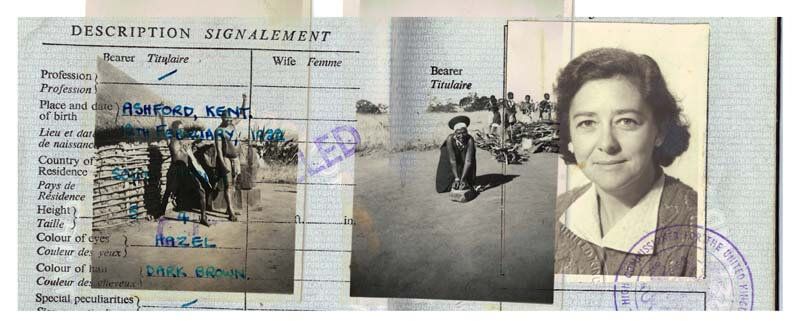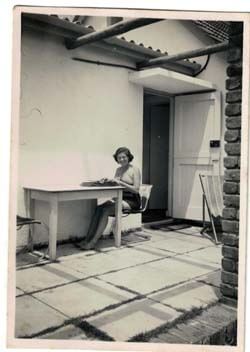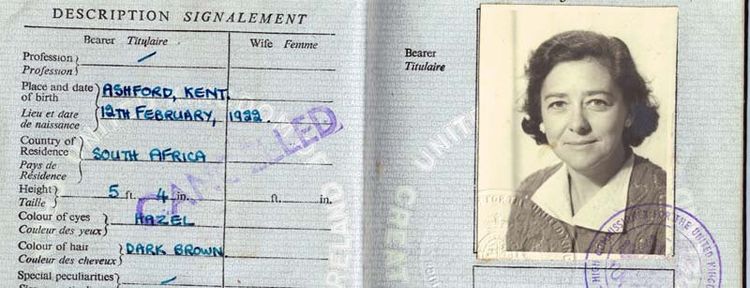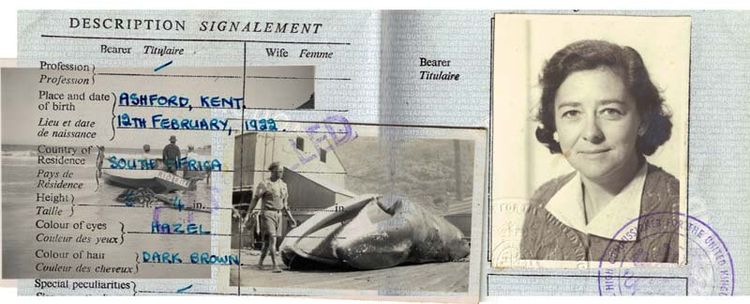Margo Williams Interview. Part 2 Sweet Thursday in a Cannery Town

Where to Find Fish in the Desert
Summary content part 2: | Interview in Under a Minute | Working for the University | Friend in the Desert | Home Stinking Home | Enemies and Wild Places | The Herero People | Home Under the Stairs |
Part 1. Africa. Heaven on Earth
Part 3. Only One Hotel in Hellsville
Interview in Under a Minute
Ghost-hunter Margo Williams and husband Walter escaped a war-cratered city of London and found themselves at a wooden town whaling station in the Namibian desert coast in Africa.
Out of the darkness of late night she walked into a bar in a desert-shack hotel heaving with English-hating Afrikaners. The air stank of cigarettes, alcohol, vomit and whale-blood.
Genius explosives expert Walter Williams summoned to solve the serious case of spontaneous combustion - exploding fish.
The Williams' journey to that moment offered a portrait of the couple, good times and bad. To Hellsville, on planet earth where “normal” is as relative as weird.
Working for the University
"Fish in the desert?" I asked Margo Williams.
"Yes," she replied. "Walter was very excited about the prospect. It was a job for the university, research work. More money and a chance to make a name in the academic community.
Walter finished his contract with the refinery and set himself up as a consultant. Many companies paid him a retainer to advise them on fish oils for factories. They were setting up all along the coast. Walter was in demand and I had never seen him so happy.
There was plenty of spare cash. Business associates encouraged him to put it into nickel shares. Every month he visited the bank to buy more, reassuring me it could not lose. It was a sure investment.
And so it seemed to be for every so often slips of paper arrived in the post, dividends from the shares. But I noticed never very much, less than what Walter was led to believe. “Better than a poke in the eye,” he said, most times. He grew up in a poor Welsh family, he walked barefoot to school. “It will get better. You wait and see.”
So I waited. Walter bought more shares. He was so confident about everything. Success with patents over his discoveries. So why shouldn't he feel confident things were going his way?
The job with the university offered greater security. They were delighted to have him, for Walter was a very clever man; they paid handsome fees for his opinion and patents. Walter's mission location was up the coast in the Namibian desert.
“How do we get there?” I asked.
“By boat. And you will have company. My co-director and his family. So you'll have a friend.”

The Friend in the Desert
It was a small comfort. We were to live in the desert and as I packed our things I felt some sadness to be leaving my friends; and had even found a special beach. But our destination was a town between the desert and the sea, so I guessed I would still be able to swim.
Walter's co-director was Afrikaans. He was taking his family, so I thought the place couldn't be all that bad. Looked forward to meeting his wife. Pleased to make friends before we arrived in a strange town; for in all probability I wouldn't see much of Walter when he got started, so I was grateful.
We waited on deck while the port crews made their final preparation to set sail. Harbour was busy but not many people on board our ship for the journey north. Walter spotted his partner along the deck and called for him to join us. A tall man, much younger than I expected.
He shook Walter's hand. “Here's Williams the explosives expert.”
Walter turned to me. “May I introduce my wife.”
He offered a small bow. “This is my wife.”
A very sophisticated, fashionable woman stepped forward. Straight black hair. A coldness in her stare. “You are British?” she asked me directly.
I replied “Yes.”
She spat in my face and walked away. Husband shrugged and followed after her.
“You'll have to learn to live with it,” said Walter.

Home Stinking Home
It was a while before I learned how the British invented the Concentration Camp, and how the Afrikaans have a long memory. She and I never were friends.
First thing I noticed about our new home was terrible stink.
Smelled it long before I saw the quayside of the canneries town. Disgusting stink. It filled the air. First I thought it just a patch of dead fish we had passed through. But no. Closer we came to land the worse it was. No use holding my breath, the appalling rotting fish smell was ever-present.
“You'll get used to it,” Walter seemed untroubled by the stench.
Never, I thought.
The town was a mass of ramshackle wooden buildings and raised wooden floor walks with salted sand for roadways. It looked like an American frontier town in Western movies.
I asked Walter where the stench came from. He pointed to a cluster of buildings. “The canning factories. See the boats at the jetty?”
I looked.
“Trawlers and factory ships. The fish is poured down chutes and straight into the factory machines. Wonderful to see,” he said excitedly. “I will show you sometime.”
I felt tired and desperate to get out of the stink. Felt it sinking into my hair and clothes. I wanted to wash and sleep. Walter wanted to see the laboratory. Only one, and it was small, made even smaller by a partition dividing into two rooms.
“The bungalow next door is for one of us,” said the co-director. It looked a shabby old place. “The newer one is over there,” he said leading us toward a group of buildings.
His fashionable wife insisted she and her family should have that and I was too tired to argue. In any case I was quite pleased as I liked the way the old one was arranged, and its furniture although a bit shabby looked more comfortable. And there was a little garden between the two buildings.

Life in a Cannery Town
Walter soon set to work in the lab, among the spaghetti of pipes and test tubes. Every day he attended the canning factories where he collected small petrie dishes of fish specimens and samples. As the days passed his work absorbed him more.
He talked a lot abut fish oils. When the director and factory managers visited they discussed fish oils. Every week he sent away for a new fish oil patent, or prepare a report on fish oils for the university. He planned to go there and give lectures about fish oils and fish oil technology.
Fish oils.
Walvis Bay in the 1940s was a terrible, fascinating place. No trees or grass. Just desert and the cluster of wooden buildings, sea and stink. Its population mostly German, for once it had been their colony. The rest were Afrikaners. People were either shopkeepers or worked in the canneries, or on board the factory ships.
The whole community lived on powdered milk, alcohol and fish. The canneries weren't the only industry, for the waste attracted thousands of pelicans and flamingos. A whole separate industry dedicated to collecting their droppings.
Despite the addition of their colourful beauty, the day couldn't come soon enough for me to get out of there.

Enemies Can Be Friends in Wild Places
On the afternoon of our arrival I made a friend. She was the most beautiful woman I had ever seen. She introduced herself and brought an offering of a box of vegetables. She wore her hair in a plait like a coronet around her head. It suited her, well. Beautiful blue eyes.
She handed me the box. “You might need them as it takes a little while to adjust to the shopping arrangements,” she said.
The vegetables were like nothing I had ever seen before. Hadn't a clue how to cook the things but accepted them as the welcome present they were meant to be. “Are you English?” She asked.
"Yes," I replied.
“I am German,” she continued. “We have been fighting each other for years. We have been enemies, but I hope we are going to be friends.”
I could have cried with happiness in that hostile land. It was the nicest thing anyone had said to me.
The Herero Community
The people I most loved were the Herero, the local tribal folk. Huge, giants in fact. I never saw a man under six feet six; and the women too were tall. I loved to see them walk through the town, trailing their long colourful skirts in the sand. They looked so elegant and dignified.
The tribal men and women were employed cleaning up the rubbish in the factories and emptying the bins. Some ran errands for the shopkeepers.
I soon became acquainted with the shopping procedure. Buying groceries was by way of the giant Herero who worked for the Grocer. We weren't permitted to go to the wooden shop and buy one or two things as required. Once a week the huge Herrero knocked on the door and handed me a notebook and pencil for me to write what we wanted for the week.
Two days later it was delivered.
Herrero Fashion Tips
I sat and watched the Hereros. Their children made a football pitch in the sand. They loved to play. I so enjoyed the sound of their language, which of course I didn't understand. European children didn't seem to play games.
I also loved to see the women in their dresses. Colourful, dots and stripes; the richer and more exotic a colour and design, the better.
The men wore any old ragged clothing. Except on Sundays when attending church. A bizarre sight in anyone's big crazy world. The women, always beautifully dressed in finest outfits. For church even the men made an effort, wore dark suits and ties. Some barefoot, others slapped along in uncomfortable-looking shoes.
At first I thought whoever had built the church could not possibly have had the Hereros in mind; for it was a long low wooden building with a wooden cross perched on top. I watched the men and women giant Hereros stooping to enter.

A Home Under the Staircase
One night, Walter was summoned by his factory-owner boss to his house on the edge of town, a large house. He asked if I would like to come along, to meet people.
We hadn't been invited for dinner and moments after arrival Walter and the man spoke the magic words of vanishing "fish oils" and closed a door in a room at the back, leaving me alone with his wife.
A muscular woman turned to fat. She seemed put out that she was expected to entertain me while the men talked. After a few cursory remarks she returned upstairs left me to wait in the hallway.
In comparison to the rudimentary comforts afforded to other workers and their households, this was palatial. I couldn't help but gaze around and noticed, sticking out from beneath the staircase a pair of black feet.
I decided to investigate. Crept closer, the feet twitched. Next appeared a face with worried eyes staring up at me. “Madam?” he asked.
I was startled he spoke English. Feet and body swung onto the ground from the little camp bed beneath the stairs. He was no giant. In fact he was remarkably small, not the usual form of Herero. Beside him was a tiny wooden stool on which a single candle burned. It was a home of sorts.
“Madam?” he asked again.
“You speak English?”
He grinned, nervous. I sensed his uneasiness. “I am alone,” I said, just above a whisper.
Thank you for your company on this introduction to Margo Williams' backstory. If you would like to know more about her investigations of the paranormal read this book. Now available from Amazon.



